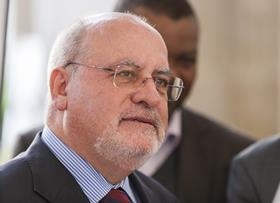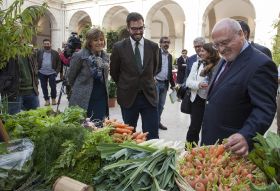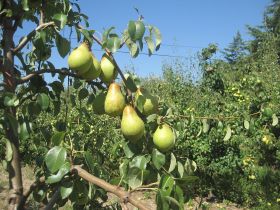
Agriculture minister Capoulas Santos talks exclusively to Fruitnet about the increasingly prominent role the country’s fruits and vegetables are playing in international markets.
What implications will the new administration have on Portugal’s fruit and vegetable industry? Will we see a significant change of direction or will you to continue to follow the policies of the previous administration towards achieving the goal of reaching sales of €2n by 2020?
Capoulas Santos: We will work to continue to support the development of the horticultural sector and agriculture in general. Both sectors have grown steadily in recent years and we want to maintain this momentum and even enhance it, if possible.  Between 2000 and 2014 the fruits vegetables and flower sector grew by an average 3.4 per cent a year, reaching €1.2bn in 2014. If we continue on this trajectory we believe we that 2020 target is achievable.
Between 2000 and 2014 the fruits vegetables and flower sector grew by an average 3.4 per cent a year, reaching €1.2bn in 2014. If we continue on this trajectory we believe we that 2020 target is achievable.
How would you summarise the past year for the fresh produce industry?
CS: The Russian embargo has had a strong impact on European agriculture, especially in the fruit and vegetable and dairy sectors. Although the European Commission has tried to minimise the effects of the ban through market management instruments set out under the Common Agricultural Policy and by applying exceptional support measures to help fruit and vegetable growers, Portugal has not escaped its effects.
Nevertheless, in spite of this particularly sensitive situation, the Portuguese fruit and vegetable industry has reacted positively. [At the time of publication] exports were running at around €1bn, equivalent to 21 per cent of all agrifood exports. We don’t yet have the final figures for the last quarter but we believe that we will exceed last year’s total.
How are government efforts to improve market access for Portuguese fruits and vegetables advancing?
CS: The Ministry of Agriculture is fully behind the industry’s internationalisation effort. Throughout 2016 we will closely monitor and assist the efforts of producers and their representative bodies to open new export markets and consolidate their presence in these regions. We believe that we cannot focus too heavily on certain markets, especially given what has happened with Russia, which prior to the ban was considered to be one of the ones with the greatest potential for Portuguese fruits and vegetables.
Rocha pears have been the big success story in Portuguese horticulture but the country has so much more to offer. How would you like to see fruit and vegetable exports develop over the coming years?
 CS: The evolution of our national industry has been based on adding value through innovation, without losing the intrinsic traditional characteristics of our products, which benefit from a good image because of their exceptional quality. One of the key ways in which producers add value is through the use of traditional conservation methods that give their products extra appeal in foreign markets. We will continue to investment in the creation of new products with even better conservation and shelf life that will enable our exporters to access even the most distant and demanding markets.
CS: The evolution of our national industry has been based on adding value through innovation, without losing the intrinsic traditional characteristics of our products, which benefit from a good image because of their exceptional quality. One of the key ways in which producers add value is through the use of traditional conservation methods that give their products extra appeal in foreign markets. We will continue to investment in the creation of new products with even better conservation and shelf life that will enable our exporters to access even the most distant and demanding markets.
What is the government hoping to achieve during the next round of CAP negotiations in order to help the country further develop its agricultural base?
CS: Right now our main concern is to ensure the full and proper implementation of the 2013 reforms. For fruits and vegetables it is essential that support arrives quickly so that businesses can invest in modernising farms and processing plants. As for future reform I would emphasise the need to continue rebalancing the distribution of funds between EU member states. We also attach great importance to the funds allocated for rural development and the contribution they make to creating an innovative, modern and sustainable industry.






No comments yet